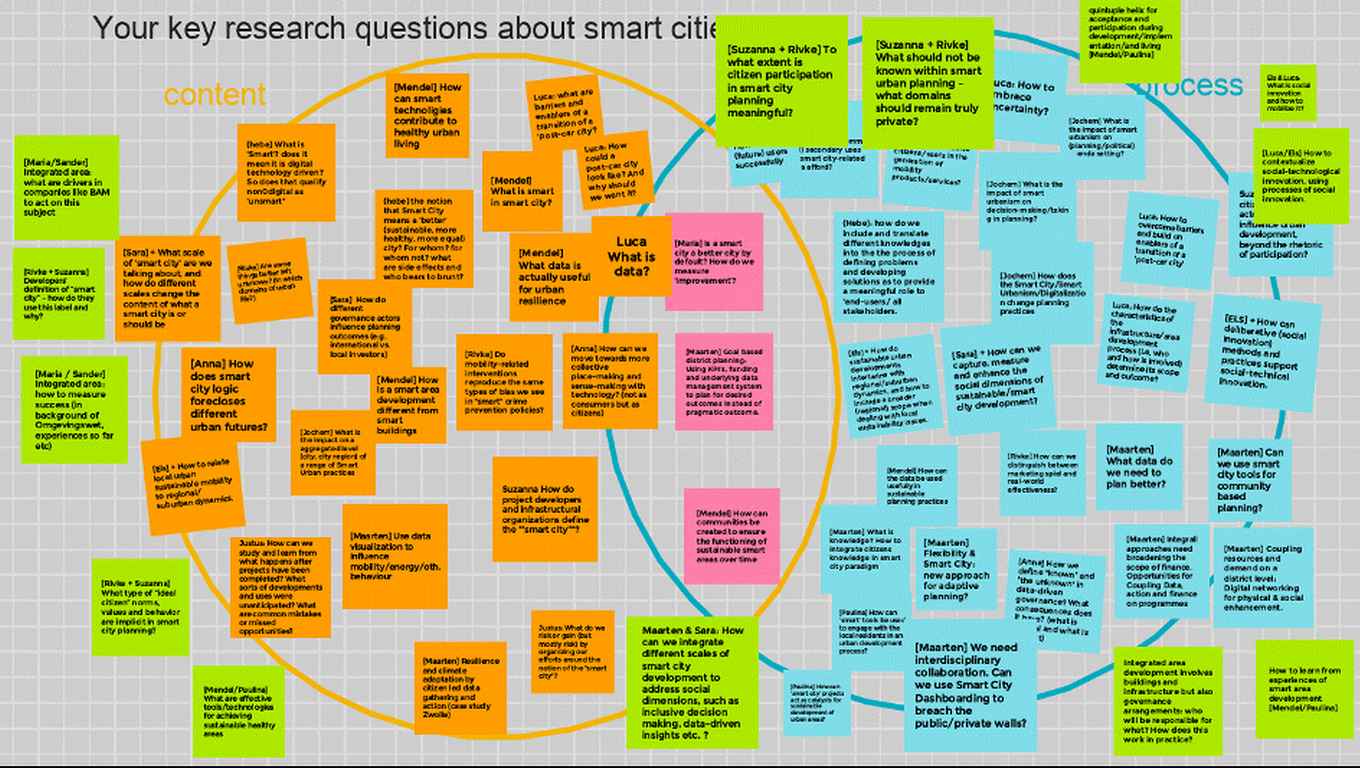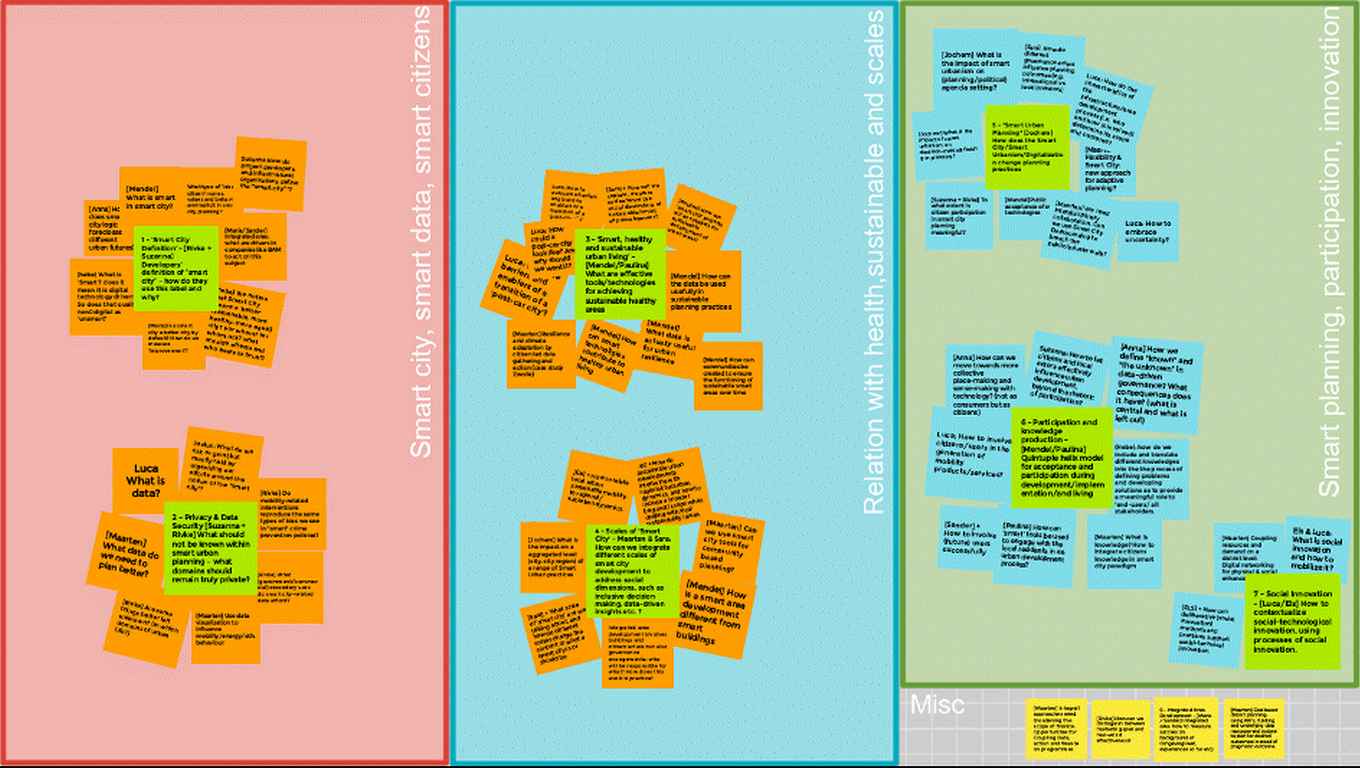Towards a Centre for Urban Studies Agenda for Future Smart Cities
By the the Urban Mobility Futures team
AM main themes in their urban development projects are ambitious: sustainability, inclusive city, healthy urban living & working, happy living and participatory development. They are eager to explore how the UvA team can help them to reflect on their practices and increase the potential of smart city developments.
With that in mind, the aims of the three workshops in November and December 2020 were to:
- articulate an independent research agenda with fundamental questions about the future of our cities from a CUS perspective
- strengthen the ties and networks between CUS colleagues and stimulating collaborations by developing joint research ideas
- explore potential links between our own academic projects and the ongoing practices by AM and partners
- connect to potential data sources and high-level stakeholder networks for our research projects.
Step 1: diverging research ideas
The meetings started with presentations from BAM Infra and AM about their current Smart City projects, their ecologies of partners and questions. These presentations and the following Q&A set the scene for the academics to brainstorm relevant research questions from their ongoing CUS research themes for smart cities. In the first round, a large number of themes were identified, after which couples were formed to explore bridges between the research themes. The brainstorm results were grouped into content-related and process-related research themes (See the jamboard below). Especially the question of 'smart city labelling' and the social side in planning and development were identified as particularly important and interesting. But also, the right handling and 'reuse' of data to analyse and improve the current situation and processes turned out to be one of the main focuses.

Step 2: converging
The second workshop was dedicated to the process of convergence - from the full jamboard towards a number of main research themes:
- Smart city, smart data & smart citizens: on definitions, the meaning and use of data and how citizens can contribute to data.
- Relation with health, sustainability and scale: on how smart city development can contribute to other, larger goals of city development.
- Smart planning, participation and innovation: on how to link smart cities with processes of city planning, and mainly on how to engage citizens in all phases of planning.
During the workshop (and afterwards) these three groups of questions were then translated into draft research agendas with the key questions, methods and possible connections with the projects of BAM Infra and AM. These agendas were further developed and pitched back to practice partners. This final CUS Smart City Research Agenda is summarized below.

Step 3: pitching / collaborating
Smart city, smart data & smart citizens research questions:
Research questions on “Smart city”:
How are smart city ambitions defined by the various actors (e.g. businesses, government, professionals, citizens, societal organizations?)
Which problems –defined by whom? are sought to be solved by these smart city ambitions?
How are these smart city ambitions actually reflected/embedded in organizational structures, work approaches and implementation practices of the various actors involved?
What components and indicators are used to implement, monitor, evaluate these “smart” ambitions and who defines them?
Research questions on “Smart data’’:
What kinds of data, information and knowledge are considered necessary –and by whom? – to realize the smart city ambitions formulated?
Which “smart” (=sensor-driven, automated) and “non-smart’’ (=non-ICT-based) data collection and analysis practices are currently in use?
What benefits and drawbacks do these data practices present to different Stakeholders?
Research questions on ‘’Smart citizens”:
With which ambitions and how are citizens contributing to “smart’’ city programs / processes?
How are citizens’ contributions employed in the processes?
Which benefits and disadvantages of citizen engagement are experienced in current practices?
What are hindering and stimulating factors in citizen engagement?
Methodologies, data collection, analysis:
- Desk research (organizational policy papers, project documents, minutes of meetings, any other documents)
- Interviews with diverse stakeholders
- Focus groups/workshops (team of colleagues within the organization in question; citizens/communities)
- Surveys
- Field observations
- Attending events, meetings, work gatherings, being present in/following work processes
- Observing data platforms
Relation with health, sustainability and scale
Research questions:
To what extent and how can smart technologies be used for dynamic health and resilience planning and governance?
Methodologies, data collection, analysis:
- Case areas in the NL (Schiphol/Harbor/Industrial zones; Smart Area Development)
- Living Lab for experimentation and innovation
- Combine Academic Knowledge with Experiential Knowledge
- Bring urban planning and governance into smart city development
- Bring the people perspective into smart city development
Participation, collaboration and knowledge in “smart city” projects
Research questions:
How to include other actors than experts? At what stage what kinds of participation are needed? What new forms of participation are needed in “smart” planning processes?
How can citizen knowledge be mobilized in “smart city” planning? What are the potential inequalities of access to knowledge and algorithmic decision-making? How does the use of smart technology change the role of citizen knowledge?
How do players actually use data from “smart” data collecting in practice?
To what extent can this form of knowledge production lead to an innovative/new planning process? What are the characteristics of this planning process? What are the characteristics of a ‘smart planning’ process?
Methodologies, data collection, analysis:
- Work together in “AM Labs”: places for experimentation (in all phases, also after completion)
- Work processes (documents (strategy/ambitions/work methods), interviews, focus groups with employees and partners)
- Older projects: gap btw ambitions & results (measure/observe/monitor and interviews)
- open.research for networking/existing data
- Observe citizen engagement sessions
Read more on the UMF website or contact the faculty members of UMF if you have any further questions. Would you like to stay updated on this project, and other CUS news? Subscribe to the CUS newsletter.